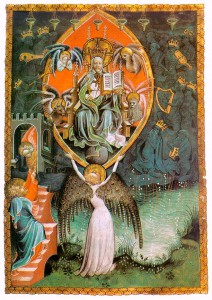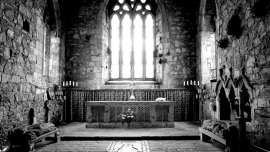
All Souls
When St. Paul talked about the resurrection of the dead with the philosophers at Athens, many laughed and mocked him (Acts 17:32). The Gospel, he would later write, is “foolishness” to the wise of this world (1 Cor. 1:18).
Yet this week’s First Reading tells us that it is foolish to think that the souls of the just are dead. Instead, theirs is a “hope full of immortality.”
By His resurrection, Jesus frees the human race from the fear of death—from the terrible fear of the unknown, of our own disintegration—that holds us in a kind of slavery (see Hebrews 2:14-15). Because He has walked the dark valley of death before us, because He has promised to walk alongside us, we can take “courage” and “fear no evil,” in the words of this week’s Psalm. This is God’s will for us, the reason Jesus came into the world, according to Sunday’s Gospel: that we will recognize Jesus as the Son of God, and by believing in Him be raised to eternal life.
If we believe in Him, we will follow Him, as the Psalmist says: He will refresh our souls in the waters of Baptism, anoint our heads with the oil of Confirmation, and set before us the table of the Eucharist. There our cups will be filled to overflowing. And by these mysteries of His kindness and goodness, we will “dwell in the house of the Lord” in this life and in the life to come.
The First Reading seems to allude to the doctrine of Purgatory, to the souls of the just being chastised, purified as gold in a furnace and made worthy of God (see 1 Cor. 3:11–12). This reading also tells us of the glory of the saints, who will share in the rule of Christ, judging and ruling over the nations (see Luke 22:30). Through the “newness of life” we have in the sacraments, this week’s Epistle adds, we “grow into union with Him,” confident that we will be “united with Him in the Resurrection.”
Saint Braulion of Saragossa (c.590-651)
Letter 19
Christ, hope of the believer, does not call those who leave this world ‘dead’ but ‘sleeping’ when he says: “Our friend Lazarus is asleep” (Jn 11,11). The apostle Paul, likewise, does not want us to be grieved “about those who have fallen asleep” (1Thes 4,13).
By this, if our faith holds that “everyone who believes” in Christ, according to his word in the Gospel, “will never die” (Jn 11,26), we know that he himself is not dead and we too will not die. Because “the Lord himself, with a word of command, with the voice of an archangel and with the trumpet of God, will come down from heaven and the dead will rise” (1Thes 4,16).
May hope in the resurrection encourage us, then, since we shall see then all those we have lost. It matters that we should firmly believe in him, that is to say that we obey his precepts, since he applies his mighty power to raising the dead with more ease than we rouse those who are asleep.
This is what we say; and yet, I don’t know through what feeling, we take refuge in tears and a feeling of regret compromises our faith. Alas! How pitiable man’s condition is, and without Christ how empty our life is! But you, O death, who are cruel enough to break the union between spouses and separate those whom friendship unites, from henceforth your power has been shattered.
From now on your pitiless yoke has been crushed by him who threatened you through the words of the prophet Hosea: “O death, I will be your death” (Hos 13,14 Vulg.). That is why we hurl our challenge together with the apostle Paul: “Where, O death, is your victory? Where, O death, is your sting?” (1Cor 15,55). He who vanquished you has redeemed us; he has delivered his beloved soul into the hands of sinners that he might make them his beloved friends.
It would take too long to call to mind everything in Holy Scripture that should bring us all consolation. It is enough to hope in the resurrection and raise our eyes to the glory of our Redeemer since it is in him that we are already raised, as our faith gives us to believe, according to the apostle Paul’s words: “If we have died with Christ we believe that we shall also live with him” (Rom 6,8).
